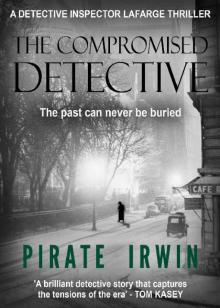- Home
- Pirate Irwin
The Tortured Detective Page 3
The Tortured Detective Read online
Page 3
He wasn’t too sure that Moreton would have the balls to help him on the latter request but he would push him as hard as he could. Moreton was a decent bloke but he was no Horatio at the bridge when it came to fighting causes that could harm his rise up the ladder.
In the meantime, Lafarge was impatient to go home to his small but charming apartment on rue de la Roquette, near Père Lachaise, best known for its huge historic cemetery. Why not live near death when you deal with it almost every day, had been Lafarge’s reasoning behind the decision to move there.
It was also not far from two great symbols of the France he had grown up to admire, revolutionary symbols in Place de la Bastille and Place de la République, but there was little in present day France of the equality, fraternity and liberty as espoused by the imperfect but idealistic heroes of a bygone age.
Lafarge sighed at that thought and calmed himself by lighting up another cigarette, breathed in deeply holding the delicious smoke inside his lungs for as long as he could and then exhaled. France might have lost and been occupied but for him, French tobacco retained its superiority over any other.
That thought cheered him up, and prompted him to spring into action and phone the pathologist to see if there would be an autopsy anytime soon because if not, he was going to go home.
“Frédéric? Lafarge here. Good, good, thank you and you? Excellent, how you remain in such good spirits with your daily routine leaves me with nothing but astonishment and respect.
“Quite, quite. Anyway Frédéric, I was just ringing to check whether the corpse that was brought in from Avenue Foch would be dealt with soon?”
Frédéric Durand, the pathologist, was a man who did not like to be hurried, tending to his subjects with almost adoring tenderness despite the intrusive nature of his work.
It was borne out of 25 years on the job, inspired by – perversely – his experiences on the World War I battlefields as a soldier. Seeing too many of his friends die, and their replacements too, had sparked in him a sentiment he preferred to be with the dead than the living for with them, there was no chance of feeling a sense of loss.
Regardless of his reason for becoming a pathologist, he had become a well–respected one and some people like Lafarge also appreciated his intense but respectful approach to the victims.
Many of Durand’s colleagues were no better than butchers and as a result often missed crucial clues that could have yielded quicker resolution of the cases. Durand too had respect for Lafarge, he had also joined up for the latest military folly and been wounded for his pains. However, he was now back in charge of his area of expertise and as enthusiastic as ever.
“Ah yes, Marguerite Suchet. She is as beautiful in death as she was on the screen. Pity she never got to play Ophelia for she makes a convincing corpse,” Durand joked darkly. “Well Lafarge it is what, 3 in the morning and I still have a few before her. But if you wish, for you I can push her to the head of the queue.”
“Yes, she’d be ideal for a silent movie now,” replied Lafarge, grinning at his riposte to Durand’s remark.
“No, don’t bother Frédéric. She isn’t going anywhere whereas I still have a bed to go to and I need some sleep because I think come the dawn, there will be pressure on all sides to solve it as quickly as possible,” replied Lafarge, relieved that he could go home with an easy conscience.
It was as he picked up his fedora that he saw the hand written note which confirmed his suspicions that this was a case the top brass wished to be kept abreast of and also if necessary to lean on him, should they feel the investigation was either going too slowly or he thought more likely in a direction they rather it didn’t.
“Inspector Lafarge, please could you be at my office at 7 tomorrow morning. We need to discuss the murder of Marguerite Suchet. Regards. Commissaire Massu.”
Lafarge sighed. He had been summoned for a face to face with the head of the Brigade Criminelle Georges–Victor Massu, which meant he would already have to have some answers for his boss when he turned up in a few hours.
He reached for the phone and dialed Durand again.
“Sorry Frédéric, better make Marguerite Suchet a priority, just received a summons from up high and it is as I suspected, they are all over this one and I better be on my game if I am not to be their scapegoat.”
Lafarge replaced the receiver, breathed in deeply and said: “Another sleepless night in paradise!”
CHAPTER THREE
“Ah! Lafarge. Good to see you, right on time too! Come in, come in!” said a smiling Massu as a rather weary and unshaven Lafarge appeared at the doorway to his sparsely–furnished office.
Lafarge grinned at his superior and took his seat opposite Massu, who had risen from his leather chair and indicated he should sit.
Massu, who was an impressive fit looking man of average height with an intelligent face and darting brown eyes – suitable, Lafarge thought, for a detective as if he was always looking and searching for the decisive clue – sat himself back down again, fidgeted with a folder in front of him, having poured Lafarge a large cup of black coffee and settled back all the time observing his subordinate.
Massu was not one for idle chit chat and with Lafarge he would say they had a businesslike relationship and a mutual respect for each other.
He was, to be honest, the best – well certainly the one with the most integrity – in his division. These days, though, integrity was not easy to judge, given the political circumstances, and all he asked was that his detectives conducted themselves with that quality, with respect to their police work.
He did not care to hear any political talk, either for or against the regime, be it the Nazis or Vichy, because for him his job was still, whether it be for a democratically–elected government or a dictatorship, to conduct oneself professionally as a policeman.
He knew Lafarge had been a prisoner of war but beyond that, he did not wish to know whether he harboured any political feelings that ran counter to those in power today. For him, Lafarge was a results man and for a case such as this he was ideal. However, he wanted to be straight with him, because while he had no doubts about his ability to carry out a thorough investigation, there were areas he could see that would be sensitive to their German confreres.
“So Lafarge, sorry for giving you a sleepless night, but I imagine you are as keen as I am to resolve this matter as quickly as possible,” said Massu.
Lafarge nodded his assent but didn’t profer any further comment.
“Thus I thought it would be useful to have a chat before you get going fully on the case, define the borders if you will,” said Massu.
“That would be useful, sir,” said Lafarge, unwilling to add any more until Massu had outlined the parameters of what was in play and what was out of bounds.
Massu absent mindedly swept his right hand through his slicked back black hair, and eyed Lafarge with a friendly grin on his face.
“This is as you know a delicate case, as it involves the Germans. As you are aware, Mademoiselle Suchet was having an affair with an Abwehr officer. Hence and for your own sake, Lafarge, you must tread carefully. I try and keep this department as independent as I can under the present circumstances, which is not easy, but it is something that I value. Thus if you are to formally question the officer in question, then I would ask you to inform me first so I can be present.
“I know this is not the norm in murder investigations but I feel that in this case it would be better for you and for the service that I am there. For if there were to be a misunderstanding, then at least I could support you and secondly, any protests would have to be addressed to me. Is that ok with you?”
Lafarge puffed out his cheeks, felt in his pocket for a cigarette and having withdrawn one, lit it. He waited until he had exhaled the first toke before speaking.
“Am I to understand from this, sir, that I am to be babysat throughout the investigation? For if that is the case then I would rather hand it to somebody more pliable.
“I can see your point about it being a delicate matter, but I would have thought that having been specifically chosen for it, this had already been taken into consideration. Especially as it is well known that the victim played a significant role in a previous case of mine which also involved one of the people I wish to speak to, Pierre–Yves de Chastelain.
“Thus I am surprised that already you are first of all speaking with me directly, as you normally observe from a distance, and that you are laying out the do’s and don’ts of my investigation. I acknowledge that you should be interested in the case.
“Compared to some of your fellow commissairs, you are an enthusiast of our profession and that is welcome. But I wouldn’t want it to become an obsession of yours to the point that I feel I am merely Sancho Panza to your Don Quixote, for that would serve neither of us well.”
Massu fiddled with his cup, ran his finger round the lip of it and rubbed his chin.
“I take your point Lafarge and good heavens no, I have no intention of babysitting you through the investigation, and no, we won’t be sitting outside the Moulin Rouge!” he said laughing at his own rather heavy joke in reference to the Don Quixote remark.
Lafarge smiled.
“Well, that’s a relief then, I’m glad you clarified that. I admit that the German will have to be handled with care, but I believe I am capable of that, even if I have been a guest of theirs for some time.”
“Yes, yes, quite regrettable, not something I would have wanted to experience,” nodded Massu, who had been too old to enlist.
“Right, you have carte blanche with regard to everyone that you wish to speak to apart from the German, is that understood?” he said and shot a look at Lafarge that brooked no argument.
Lafarge nodded and said: “Here is the list of the other people of immediate interest: the maid, though she wasn’t there as she lives on the top floor, de Chastelain, and I think for the moment that’s it. Not a long list so hopefully, either one of them is the murderer or they give us a lead to someone else.”
Massu nodded but Lafarge sensed it wasn’t the end of the matter as his boss poured him and himself another cup of coffee, without asking him mind you, but he was grateful for it as he was dog tired. Massu took off his glasses, rubbed the bridge of his nose and pulled at his bottom lip. Lafarge could sense that whatever Massu had to say it wasn’t going to be good news.
“There are two further tricky things I have to discuss with you, Lafarge. Firstly, de Chastelain may prove harder to interview than you think, for as you may be aware, he disappeared from view a few days ago.
“It was rather timely on his part, for he was due to be arrested the following day over some of his ‘patriotic activities’ apparently.
“It left René Bousquet hopping mad as you can imagine. He had wanted to prove that his boys were capable of arresting someone who has actually perpetrated crimes against the present government rather than just carrying out routine reprisals against the Jews which he has enforced with such ardour and unbridled enthusiasm,” said Massu with a note of disgust in his voice.
“Ah and no sightings of de Chastelain since?” asked Lafarge.
Massu shook his head and added: “I have a feeling that his disappearance wasn’t coincidental, indeed we know that he received a visit from your victim the eve of his date with Bousquet.”
Lafarge sighed and thought how convenient and even more so that his ex–lover dies a few days later, perhaps there is a link there too.
He kept it to himself for the moment, preferring that his discussion with his superior come to a quick end so he could get on with his investigation.
“I am sure I will be able to get a lead on where he is sir, I know several of his friends personally and one of them should be able to help. I have found no–one is especially loyal when a friend of theirs is implicated in the murder of a woman.”
“I am reassured by your confidence in people’s morals these days,” said Massu smiling sadly.
“Anyway I will let you get on with that, but just the second and final thing and it is something I touched on earlier.
“I have fought hard to try and keep as I said this department as independent of interference from both Bousquet and our foreign overlords, and I have to say with a fair amount of success,” he said with pride in his voice.
“Thus I cannot emphasize more that you play this one very carefully Lafarge, there is no really by the book these days, that I acknowledge, but play it tough but fair and with the utmost delicacy. There is no light at the end of the present dark tunnel politically speaking, so for the moment we play the masters tune, or at least on the outside we do.
“I need not say more than to let you know that Bousquet himself is paying close attention to this case, not just because the victim was a favourite of the Germans but because he wants to take charge of it if there are any complaints or serious errors in our enquiry.
“He wishes to ingratiate himself even further with the Nazis. It is said he harbours ambitions to replace either Laval or even the Marshal.
“So no foul–ups and I speak with regard not only to my own goal in keeping ourselves free of his dark influence but also with regard to your long term health. The stakes for all of us are extremely high, inspector, if one of us falls, we all fall.”
Lafarge wandered back to his office in a thoughtful mood.
Nothing he had experienced during the German invasion had posed quite so many problems as what he now faced.
Admittedly, the fight hadn’t lasted very long and the Germans, for the most part, had acted in a chivalrous fashion towards their defeated opponents. But now he felt very alone and if it wasn’t bad enough having one key potential player in the story missing, he also had the weight of his service and its future weighing on his shoulders.
It was times like this that he regretted not having a partner, not just to share the burden of the investigation but also to give him some sound advice.
Having a younger version of Massu alongside him would have been ideal but there was nobody, so it would have to be him, his gut instinct and his limited diplomatic skills, that ploughed on and would probably dig up more skeletons than lay fertile seeds.
Sure, he had family and friends. But the former were scattered around France, his parents were in Vichy where his father was Marshal Petain’s most trusted advisor, his wife Isabella was in Nice with the two children, so it was only the latter he could fall back on.
Fortunately, several of his friends like his father were high up in Vichy circles or were much valued by the Nazis, although Bousquet was not one of them.
Indeed there was personal animosity between them dating back to before the War, when Bousquet took great pleasure at ridiculing Lafarge and his choice of profession. But it was more due to the fact that the detective he so despised had won the hand of Isabella Contreras, daughter of an Argentine diplomat, when he had been keen to marry her.
Lafarge mused on the irony that now Bousquet was in charge of a force he claimed to despise and also that the other reason for their discord, Isabella, was no longer in Paris.
He would not surrender to the thought that she was gone forever, but her coolness on departing once he had returned from the POW camp hadn’t encouraged him to join her in Nice. That had been a year ago, and contact since had been limited to a phone call a month and mainly involved talking about how the children were: Philippe their five–year–old son and daughter Isadora, who was three. Well at least she had yet to say she wanted a divorce, but she never enquired into whether he was seeing anyone else and likewise he preferred not to know if she was.
He still missed her, not just for her blonde hair, brown eyes and petite physique, but for her solid common sense which was most unlike Latin Americans, and her ability to make him laugh.
And Lafarge had to admit there were not many of the opposite sex who achieved that. Marguerite Suchet had at one time, despite her ordeal at the hands of the rapist, but her association with de Chaste
lain had brought the curtain down on that possibility.
Lafarge tore himself away from such maudlin thoughts and looked on the upside which was that with Isabella not in Paris he at least had no distraction and could devote himself wholeheartedly to the case.
Christ, the case! What bloody case, or at least where the hell do I start? He stroked his unshaven jaw – which despite his full head of sandy blond hair and only being 38 was salt and pepper colour – and took one more look at the autopsy findings so as to clarify those details and to buy himself some time in deciding on his next step.
They made relatively pleasant reading, well compared to many other murders he had investigated where the corpses had been mutilated or dismembered.
This certainly reeked of a crime of passion. For Marguerite had been shot once, just below the right lung, and had enjoyed a bout of lovemaking prior to the fatal shot, though when was difficult to ascertain.
The sex had definitely been consensual according to Durand, who had added the time of death would have occurred around midnight.
Judging by the careful manner in which the corpse had been laid out on the sofa, there was no way that this was a burglary despite the disarray in her bedroom. His general experience with burglars was that murder was the last thing on their minds and if it led to that they left the scene in a hurry and not after looking after the corpse.
With the sex having been pleasurable, well obviously he didn’t know if she had derived ultimate pleasure from it but it hadn’t been forced, the most obvious candidate for the man in the act was Colonel von Dirlinger, but he didn’t want to interview him straight away, for Lafarge wanted to be fresher than he felt now.
Massu would also probably prefer he had shaved as well so as to give a good impression of his service, and he wanted to at least have some deeper background to play with when they met. For that reason he decided to pay a visit to Marguerite’s maid first.

 The Compromised Detective
The Compromised Detective The Twisted Patriot
The Twisted Patriot The Tortured Detective
The Tortured Detective The Haunted Detective
The Haunted Detective